- Home
- Thomas Harris
Red Dragon Page 14
Red Dragon Read online
Page 14
Molly and Willy were among the first off the plane at National Airport in Washington. She spotted Graham in the crowd, did not smile, but turned to Willy and said something as they walked swiftly ahead of the stream of tourists returning from Florida.
She looked Graham up and down and came to him with a light kiss. Her brown fingers were cold on his cheek.
Graham felt the boy watching. Willy shook hands from a full arm’s length away.
Graham made a joke about the weight of Molly’s suitcase as they walked to the car.
“I’ll carry it,” Willy said.
A brown Chevrolet with Maryland plates moved in behind them as they pulled out of the parking lot.
Graham crossed the bridge at Arlington and pointed out the Lincoln and Jefferson memorials and the Washington Monument before heading east toward the Chesapeake Bay. Ten miles outside Washington the brown Chevrolet pulled up beside them in the inside lane. The driver looked across with his hand to his mouth and a voice from nowhere crackled in the car.
“Fox Edward, you’re clean as a whistle. Have a nice trip.”
Graham reached under the dash for the concealed microphone. “Roger, Bobby. Much obliged.”
The Chevrolet dropped behind them and its turn signal came on.
“Just making sure no press cars or anything were following,” Graham said.
“I see,” Molly said.
They stopped in the late afternoon and ate crabs at a roadside restaurant. Willy went to look at the lobster tank.
“I hate it, Molly. I’m sorry,” Graham said.
“Is he after you now?”
“We’ve had no reason to think so. Lecter just suggested it to him, urged him to do it.”
“It’s a clammy, sick feeling.”
“I know it is. You and Willy are safe at Crawford’s brother’s house. Nobody in the world knows you’re there but me and Crawford.”
“I’d just as soon not talk about Crawford.”
“It’s a nice place, you’ll see.”
She took a deep breath and when she let it out the anger seemed to go with it, leaving her tired and calm. She gave him a crooked smile. “Hell, I just got mad there for a while. Do we have to put up with any Craw-fords?”
“Nope.” He moved the cracker basket to take her hand. “How much does Willy know?”
“Plenty. His buddy Tommy’s mother had a trash newspaper from the supermarket at their house. Tommy showed it to Willy. It had a lot of stuff about you, apparently pretty distorted. About Hobbs, the place you were after that, Lecter, everything. It upset him. I asked him if he wanted to talk about it. He just asked me if I knew it all along. I said yes, that you and I talked about it once, that you told me everything before we got married. I asked him if he wanted me to tell him about it, the way it really was. He said he’d ask you to your face.”
“Damn good. Good for him. What was it, the Tattler ?”
“I don’t know, I think so.”
“Thanks a lot, Freddy.” A swell of anger at Freddy Lounds lifted him from his seat. He washed his face with cold water in the rest room.
Sarah was saying good night to Crawford in the office when the telephone rang. She put down her purse and umbrella to answer it.
“Special Agent Crawford’s office. . . . No, Mr. Graham is not in the office, but let me . . . Wait, I’ll be glad to . . . Yes, he’ll be in tomorrow afternoon, but let me . . .”
The tone of her voice brought Crawford around his desk.
She held the receiver as though it had died in her hand. “He asked for Will and said he might call back tomorrow afternoon. I tried to hold him.”
“Who?”
“He said, ‘Just tell Graham it’s the Pilgrim.’ That’s what Dr. Lecter called—”
“The Tooth Fairy,” Crawford said.
Graham went to the grocery store while Molly and Willy unpacked. He found canary melons at the market and a ripe cranshaw. He parked across the street from the house and sat for a few minutes, still gripping the wheel. He was ashamed that because of him Molly was rooted out of the house she loved and put among strangers.
Crawford had done his best. This was no faceless federal safe house with chair arms bleached by palm sweat. It was a pleasant cottage, freshly whitewashed, with impatiens blooming around the steps. It was the product of careful hands and a sense of order. The rear yard sloped down to the Chesapeake Bay and there was a swimming raft.
Blue-green television light pulsed behind the curtains. Molly and Willy were watching baseball, Graham knew.
Willy’s father had been a baseball player, and a good one. He and Molly met on the school bus, married in college.
They trooped around the Florida State League while he was in the Cardinals’ farm system. They took Willy with them and had a terrific time. Spam and spirit. He got a tryout with the Cardinals and hit safely in his first two games. Then he began to have difficulty swallowing. The surgeon tried to get it all, but it metastasized and ate him up. He died five months later, when Willy was six.
Willy still watched baseball whenever he could. Molly watched baseball when she was upset.
Graham had no key. He knocked.
“I’ll get it.” Willy’s voice.
“Wait.” Molly’s face between the curtains. “All right.”
Willy opened the door. In his fist, held close to his leg, was a fish billy.
Graham’s eyes stung at the sight. The boy must have brought it in his suitcase.
Molly took the bag from him. “Want some coffee? There’s gin, but not the kind you like.”
When she was in the kitchen, Willy asked Graham to come outside.
From the back porch they could see the riding lights of boats anchored in the bay.
“Will, is there any stuff I need to know to see about Mom?”
“You’re both safe here, Willy. Remember the car that followed us from the airport making sure nobody saw where we went? Nobody can find out where you and your mother are.”
“This crazy guy wants to kill you, does he?”
“We don’t know that. I just didn’t feel easy with him knowing where the house is.”
“You gonna kill him?”
Graham closed his eyes for a moment. “No. It’s just my job to find him. They’ll put him in a mental hospital so they can treat him and keep him from hurting anybody.”
“Tommy’s mother had this little newspaper, Will. It said you killed a guy in Minnesota and you were in a mental hospital. I never knew that. Is it true?”
“Yes.”
“I started to ask Mom, but I figured I’d ask you.”
“I appreciate your asking me straight out. It wasn’t just a mental hospital; they treat everything.” The distinction seemed important. “I was in the psychiatric wing. It bothers you, finding out I was in there. Because I’m married to your mom.”
“I told my dad I’d take care of her. I’ll do it too.”
Graham felt he had to tell Willy enough. He didn’t want to tell him too much.
The lights went out in the kitchen. He could see Molly’s dim outline inside the screen door and he felt the weight of her judgment. Dealing with Willy he was handling her heart.
Willy clearly did not know what to ask next. Graham did it for him.
“The hospital part was after the business with Hobbs.”
“You shot him?”
“Yes.”
“How’d it happen?”
“To begin with, Garrett Hobbs was insane. He was attacking college girls and he . . . killed them.”
“How?”
“With a knife; anyway I found a little curly piece of metal in the clothes one of the girls had on. It was the kind of shred a pipe threader makes—remember when we fixed the shower outside?
“I was taking a look at a lot of steamfitters, plumbers and people. It took a long time. Hobbs had left this resignation letter at a construction job I was checking. I saw it and it was . . . peculiar. He wasn’t working anywhere, a
nd I had to find him at home.
“I was going up the stairs in Hobbs’s apartment house. A uniformed officer was with me. Hobbs must have seen us coming. I was halfway up to his landing when he shoved his wife out the door and she came falling down the stairs dead.”
“He had killed her?”
“Yeah. So I asked the officer I was with to call for SWAT, to get some help. But then I could hear kids in there and some screaming. I wanted to wait, but I couldn’t.”
“You went in the apartment?”
“I did. Hobbs had caught this girl from behind and he had a knife. He was cutting her with it. And I shot him.”
“Did the girl die?”
“No.”
“She got all right?”
“After a while, yes. She’s all right now.”
Willy digested this silently. Faint music came from an anchored sailboat.
Graham could leave things out for Willy, but he couldn’t help seeing them again himself.
He left out Mrs. Hobbs on the landing clutching at him, stabbed so many times. Seeing she was gone, hearing the screaming from the apartment, prying the slick red fingers off and cracking his shoulder before the door gave in. Hobbs holding his own daughter, busy cutting her neck when he could get to it, her struggling with her chin tucked down, the .38 knocking chunks out of him and he still cutting and he wouldn’t go down. Hobbs sitting on the floor crying and the girl rasping. Holding her down and seeing Hobbs had gotten through the windpipe, but not the arteries. The daughter looked at him with wide glazed eyes and at her father sitting on the floor crying “See? See?” until he fell over dead.
That was where Graham lost his faith in .38’s.
“Willy, the business with Hobbs, it bothered me a lot. You know, I kept it on my mind and I saw it over and over. I got so I couldn’t think about much else. I kept thinking there must be some way I could have handled it better. And then I quit feeling anything. I couldn’t eat and I stopped talking to anybody. I got really depressed. So a doctor asked me to go into the hospital, and I did. After a while I got some distance on it. The girl that got hurt in Hobbs’s apartment came to see me. She was okay and we talked a lot. Finally I put it aside and went back to work.”
“Killing somebody, even if you have to do it, it feels that bad?”
“Willy, it’s one of the ugliest things in the world.”
“Say, I’m going in the kitchen for a minute. You want something, a Coke?” Willy liked to bring Graham things, but he always made it a casual adjunct to something he was going to do anyway. No special trip or anything.
“Sure, a Coke.”
“Mom ought to come out and look at the lights.”
Late in the night Graham and Molly sat in the back-porch swing. Light rain fell and the boat lights cast grainy halos on the mist. The breeze off the bay raised goose bumps on their arms.
“This could take a while, couldn’t it?” Molly said.
“I hope it won’t, but it might.”
“Will, Evelyn said she could keep the shop for this week and four days next week. But I’ve got to go back to Marathon, at least for a day or two when my buyers come. I could stay with Evelyn and Sam. I should go to market in Atlanta myself. I need to be ready for September.”
“Does Evelyn know where you are?”
“I just told her Washington.”
“Good.”
“It’s hard to have anything, isn’t it? Rare to get it, hard to keep it. This is a damn slippery planet.”
“Slick as hell.”
“We’ll be back in Sugarloaf, won’t we?”
“Yes we will.”
“Don’t get in a hurry and hang it out too far. You won’t do that?”
“No.”
“Are you going back early?”
He had talked to Crawford half an hour on the phone.
“A little before lunch. If you’re going to Marathon at all, there’s something we need to tend to in the morning. Willy can fish.”
“He had to ask you about the other.”
“I know, I don’t blame him.”
“Damn that reporter, what’s his name?”
“Lounds. Freddy Lounds.”
“I think maybe you hate him. And I wish I hadn’t brought it up. Let’s go to bed and I’ll rub your back.”
Resentment raised a minute blister in Graham. He had justified himself to an eleven-year-old. The kid said it was okay that he had been in the rubber Ramada. Now she was going to rub his back. Let’s go to bed—it’s okay with Willy.
When you feel strain, keep your mouth shut if you can.
“If you want to think awhile, I’ll let you alone,” she said.
He didn’t want to think. He definitely did not. “You rub my back and I’ll rub your front,” he said.
“Go to it, Buster.”
Winds aloft carried the thin rain out over the bay and by nine A.M. the ground steamed. The far targets on the sheriff’s department range seemed to flinch in the wavy air.
The rangemaster watched through his binoculars until he was sure the man and woman at the far end of the firing line were observing the safety rules.
The Justice Department credentials the man showed when he asked to use the range said “Investigator.” That could be anything. The rangemaster did not approve of anyone other than a qualified instructor teaching pistol-craft.
Still, he had to admit the fed knew what he was doing.
They were only using a .22-caliber revolver but he was teaching the woman combat shooting from the Weaver stance, left foot slightly forward, a good two-handed grip on the revolver with isometric tension in the arms. She was firing at the silhouette target seven yards in front of her. Again and again she brought the weapon up from the outside pocket of her shoulderbag. It went on until the rangemaster was bored with it.
A change in the sound brought the rangemaster’s glasses up again. They had the earmuffs on now and she was working with a short, chunky revolver. The rangemaster recognized the pop of the light target loads.
He could see the pistol extended in her hands and it interested him. He strolled along the firing line and stood a few yards behind them.
He wanted to examine the pistol, but this was not a good time to interrupt. He got a good look at it as she shucked out the empties and popped in five from a speedloader.
Odd arm for a fed. It was a Bulldog .44 Special, short and ugly with its startling big bore. It had been extensively modified by Mag Na Port. The barrel was vented near the muzzle to help keep the muzzle down on recoil, the hammer was bobbed and it had a good set of fat grips. He suspected it was throated for the speed-loader. One hell of a mean pistol when it was loaded with what the fed had waiting. He wondered how the woman would stand up to it.
The ammunition on the stand beside them was an interesting progression. First there was a box of lightly loaded wadcutters. Then came regular service hardball, and last was something the rangemaster had read much about but had rarely seen. A row of Glaser Safety Slugs. The tips looked like pencil erasers. Behind each tip was a copper jacket containing number-twelve shot suspended in liquid Teflon.
The light projectile was designed to fly at tremendous velocity, smash into the target and release the shot. In meat the results were devastating. The rangemaster even recalled the figures. Ninety Glasers had been fired at men so far. All ninety were instant one-shot stops. In eighty-nine of the cases immediate death resulted. One man survived, surprising the doctors. The Glaser round had a safety advantage too—no ricochets, and it would not go through a wall and kill someone in the next room.
The man was very gentle with her and encouraging, but he seemed sad about something.
The woman had worked up to the full service loads now and the rangemaster was pleased to see she handled the recoil very well, both eyes open and no flinch. True, it took her maybe four seconds to get the first one off, coming up from the bag, but three were in the X ring. Not bad for a beginner. She had some talent.
He had been back in the tower for some time when he heard the hellish racket of the Glasers going off.
She was pumping all five. It was not standard federal practice.
The rangemaster wondered what in God’s name they saw in the silhouette that it would take five Glasers to kill.
Graham came to the tower to turn in the earmuffs, leaving his pupil sitting on a bench, head down, her elbows on her knees.
The rangemaster thought he should be pleased with her, and told him so. She had come a long way in one day. Graham thanked him absently. His expression puzzled the rangemaster. He looked like a man who had witnessed an irrevocable loss.
16
The caller, “Mr. Pilgrim,” had said to Sarah that he might call again on the following afternoon. At FBI headquarters certain arrangements were made to receive the call.
Who was Mr. Pilgrim? Not Lecter—Crawford had made sure of that. Was Mr. Pilgrim the Tooth Fairy? Maybe so, Crawford thought.
The desks and telephones from Crawford’s office had been moved overnight to a larger room across the hall.
Graham stood in the open doorway of a soundproof booth. Behind him in the booth was Crawford’s telephone. Sarah had cleaned it with Windex. With the voiceprint spectrograph, tape recorders, and stress evaluator taking up most of her desk and another table beside it, and Beverly Katz sitting in her chair, Sarah needed something to do.
The big clock on the wall showed ten minutes before noon.
Dr. Alan Bloom and Crawford stood with Graham. They had adopted a sidelines stance, hands in their pockets.
A technician seated across from Beverly Katz drummed his fingers on the desk until a frown from Crawford stopped him.
Crawford’s desk was cluttered with two new telephones, an open line to the Bell System’s electronic switching center (ESS) and a hot line to the FBI communications room.
“How much time do you need for a trace?” Dr. Bloom asked.
“With the new switching it’s a lot quicker than most people think,” Crawford said. “Maybe a minute if it comes through all-electronic switching. More if it’s from someplace where they have to swarm the frame.”

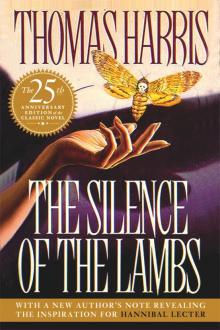 The Silence of the Lambs
The Silence of the Lambs Red Dragon
Red Dragon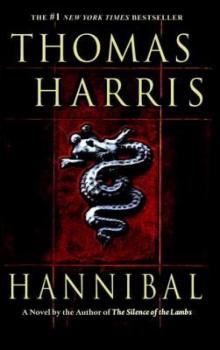 Hannibal
Hannibal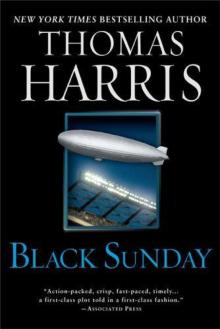 Black Sunday
Black Sunday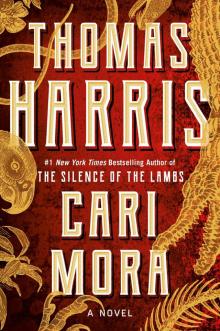 Cari Mora
Cari Mora Hannibal Rising
Hannibal Rising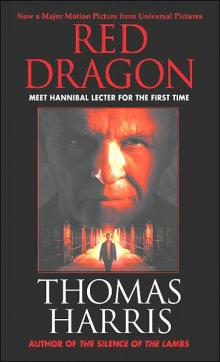 Red Dragon hl-1
Red Dragon hl-1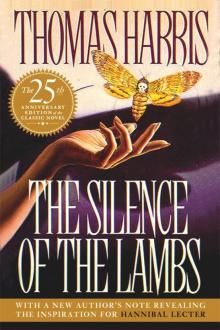 The Silence of the Lambs (Hannibal Lecter)
The Silence of the Lambs (Hannibal Lecter)